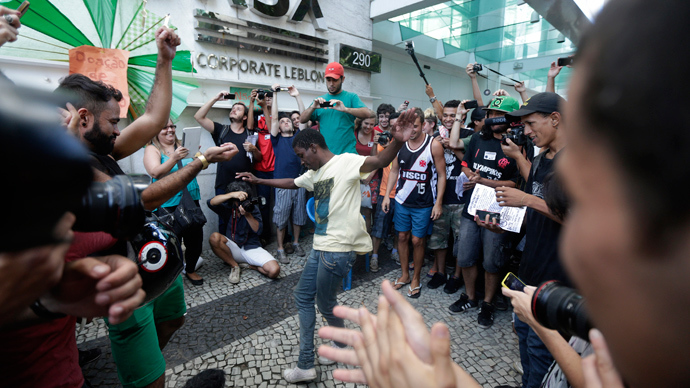Mall rats: Brazilian flash mob forces closure of luxury shopping center

Protests by Brazil’s poor against the rich have taken a new turn. Local black youths are taking to shopping malls usually visited by the wealthy, cooking barbecues and dancing. The seemingly innocent rallies are drawing the government’s attention.
The latest protest of the kind led to a shutdown of one of the Rio de Janeiro’s upmarket malls.
Nine thousand people joined the Facebook page of the flash mob.
According to the report by local media outlet Terra, the social
network deleted the event when it had over 500 people confirmed.
However, only a few dozen took part in the flash mob. The
participants held a barbecue outside the mall, set up speakers
and danced to the music. One of the protesters was dressed as
Batman, and another one as the Joker.
Shopping Leblon, the mall that was shut down, is a center that
consists of 200 luxurious boutiques, restaurants and cinemas.
The owners tried to ban the event, fearing violence, but failed.
Instead, they closed the mall and left notices on the doors of
the mall in Portuguese and English that read, "To ensure the
safety and wellbeing of all customers, tenants and employees,
Shopping Leblon informs that the center will be exceptionally
closed today, 19 January."
“Looks like we're bums who want to break the mall,”
Fábio Fleck, one of the organizers, told Terra TV. “It is
disappointing that we have more police than protesters. We’re not
even a movement, just a group of people who met through
Facebook.”

President Dilma Rousseff actually organized a meeting of top
aides to form a response to the flash mob activity.
It’s not by any means the first time a mall has been targeted.
Over the past months, almost a dozen shopping centers were chosen
as the place for rolezhinhos. The main features of the activity
is that black, poor youths gather in the place that’s usually
considered a place for rich, white customers.
The first rolezinho happened at Shopping Itaquera in the suburbs
of São Paulo last month. It was staged by fans of Funk
Ostentação, a music style that appeared in poor favelas that is
about showing off one’s money, flashy cars and expensive drinks.
The phenomenon has many sides to it. On one hand, the teenagers
do what normal youths would in a huge shopping center: they hang
out and have fun. On the other, the activity has been boosted by
police presence, social media coverage. In one case, there were
6,000 people participating.
Plus, despite Brazilians being able to purchase more and more
goods and becoming better-off, the country’s general population
remains angry at the inequality.
"People in favelas usually only enter malls to work in the
shops. The customers are almost all rich, white people,"
Hanier Ferrer, a 23-year-old student, told The Guardian.
"The people from the favelas and the periphery want to prove
they are just like everyone else. They want a rethink of social
relations."















